HURON, TENNESSEE USA
Jo Ann Gross
Henderson County Times Community Series
May 7, 1980
Henderson County Times
Huron was just timberland when it became a town. It was named Huron in honor of Lake Huron by Tenn. [Midland] Railroad.
Some of the first settlers were John A. Smith, Arch Joyner, Rev. Clayborne Bell, C. T. Flake, Bob Odell, J. H. Wilson, E. T. Lawer, John Cawthon.
They cleared land, built houses, stores, a school, grist mill, sawmill, cotton gin and post office.
Travel was done on horseback, buggies, train and walking.
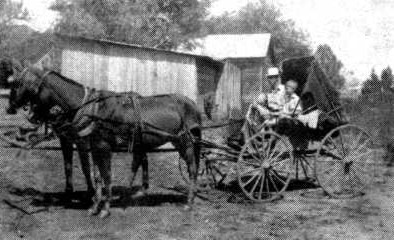
A good way to travel in the 1920's.
The train depot was built in Huron in the early 1900's. It was located on the old railroad bed before tracks were moved beside Bill Gilham's store.
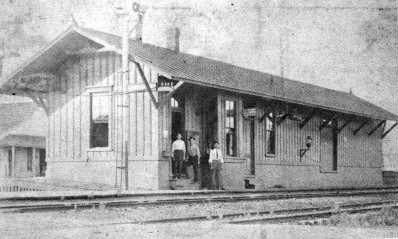
Depot in Huron. Train stopped 4 times daily.
The train stopped four times a day, bringing supplies, mail, and passengers. Travel was cheap back then. You could ride to Jackson for 25 cents and to Lexington for 10 cents. People visited each other and had ice cream socia1s, stews, and just old fashioned get-togethers.
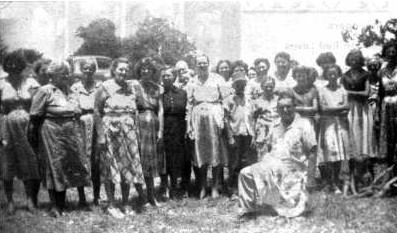
B. D. Anderson is the cook at a stew held in Huron in the '50s.
Picture furnished by Pauline Belew.
The old tracks were moved to the present location in 1946.
Section Lot houses still stand today. Railroad workers and their families lived in these houses. They repaired tracks, and layed new rails. As many as 16 people lived in a four room house.
There were five general merchandise stores located in Huron. The merchants were W. T. Smith, John Taylor, J. S. Teague, L. F. Hanna, J. W. Plunk, Hugh Courtney, W. L. McHaney, F. H. Gilliam, T. N. West, Walker and Son, Henry Linton, Huron Gro. Co., Adcox & Melton, Threadgill, R. C. White and Farris Bell, Ran Whittle.
They sold everything from seed, clothing, plows and tools.
Most everyone grew their own food except for staples such as coffee and sugar.
They made their own clothes.
Supplies came in on the train. If you had transportation you could go to Jackson and pick them up.
Three original buildings are still standing. They are Bill Gilliams store, Tom Threadgill's store which is Harris Furniture store today. Later merchants were Floyd Smith, D. L. Brittain, Vedes Harris, Jimmy Wells, Joe Belew, Bobby Gross, Bill Gross, Jerry McBride, Bubby Williams, Charles Joyner, Johnny Johnson. The store closed in 1979 for the first time. Huron does not now have a store.
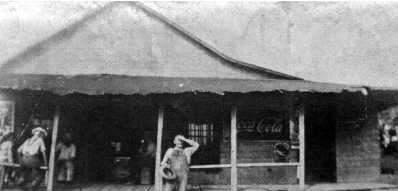
Tom Threadgill's store which is still standing. It is Harris Furniture
store at present.
The first car was owned by Will Walker. It was a T Model Ford and cost around S400.00. Gas sold for 12 cents a gallon. It was pumped by hand.
Tires were ordered from Sears & Roebuck Co.
Mr. M. H. Maxwell had a blacksmith shop. He made harness, shod horses, and fixed buggies and wagon wheels.
It was not unusual on a Saturday evening after a dice game or a fight to see Dr. Dickson sewing up someone on a front porch.
The first church was Huron Baptist built in 1884 by John A. Smith. It was later moved to the site where it sits now.
School was taught in the church. Later Huron School was built in 1901. It is now the home of Hazel and Tom Manley.
The first teachers were Emma Kimbrough, Minnie Spellings, Katie Skipper, Nannie Crook, Ross Crook, E. C. Smith, Ela Pearson, W. R. Wilson, I. N. Chamberlain, Bilton McCleary, W. E. Johnson.
Kids rode horseback or walked as far as 10 miles a day to go to school.
The cotton gin was built by John Wilson and W. L. Cawthon. In later years the gin was owned by M. H. Stewart. It burned in 1955 and 1956 and was never built back.
The first post office was built in 1898 in front of Bill Gilliam's store. Two rural routes were established in 1903. The present post office was built in 1959 by Betty Joyner.
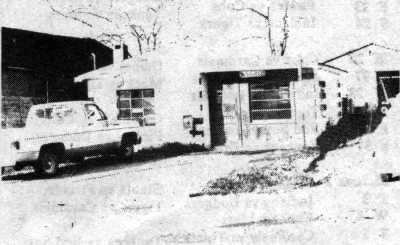
Huron Postoffice today.
The post masters were J. S. Teague, J. W. Plunk, J. M. Threadgill, M. H. Fesmire, J. M. Evans, Mildred Perkins, Betty Gross Joyner, Pauline Belew.
The carriers were W. E. Johnson, E. W. Bailey, M. L. Austin, Bryon Johnson, L. A. Lawer, Joe Brantley, and Jr. Myracle.
Huron was first considered by Bemis Cotton Mill for the site of their mill before building in Bemis.
There is not much activity in Huron these days. Except a lot of good memories and good neighbors. Most all the old places are gone and a lot of the people.
But you can ask old and young alike and they still think its the garden spot of the world.
Information was furnished to the Times by Joann Gross and the old pictures were furnished by Loyd Smith and Mrs. Minnie Bailey.
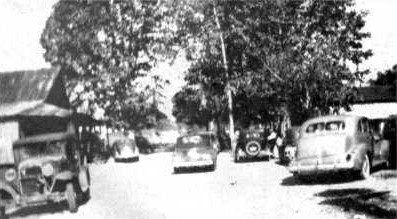
Main Street of Huron in 1940.
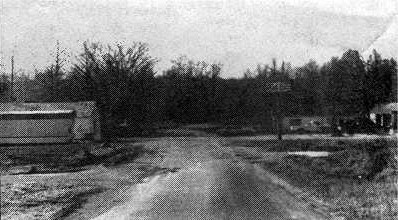
Downtown Huron today.
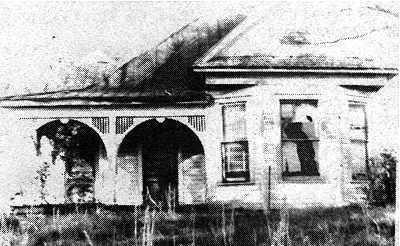
One of the first houses built in Huron is still standing today.
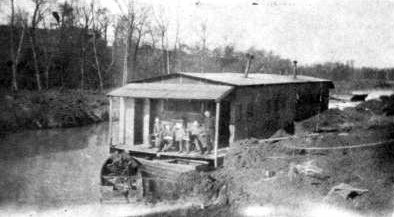
Huron Canal was dredged in 1914. It runs into the
Mississippi River.
Captions of photographs too poor to reproduced:
Crowd in Huron in 1940 in front of Mr. Floyd Smith's store.
Old timey hog killing.
The First Baptist Church in Huron.
The old Huron School which has been made into a residence.
The Ollie Grove School in the fall of 1955. Mrs. Edward Cogdell was the
teacher
of all eight grades
